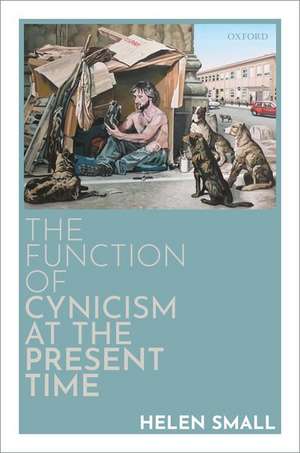The Function of Cynicism at the Present Time
Autor Helen Smallen Limba Engleză Hardback – 29 iun 2020
Preț: 274.51 lei
Nou
Puncte Express: 412
Preț estimativ în valută:
52.53€ • 54.85$ • 43.37£
52.53€ • 54.85$ • 43.37£
Carte disponibilă
Livrare economică 14-20 martie
Livrare express 11-15 martie pentru 51.18 lei
Preluare comenzi: 021 569.72.76
Specificații
ISBN-13: 9780198861935
ISBN-10: 0198861931
Pagini: 288
Ilustrații: 2 Illustrations
Dimensiuni: 163 x 238 x 23 mm
Greutate: 0.62 kg
Editura: OUP OXFORD
Colecția OUP Oxford
Locul publicării:Oxford, United Kingdom
ISBN-10: 0198861931
Pagini: 288
Ilustrații: 2 Illustrations
Dimensiuni: 163 x 238 x 23 mm
Greutate: 0.62 kg
Editura: OUP OXFORD
Colecția OUP Oxford
Locul publicării:Oxford, United Kingdom
Recenzii
Adeptly employing classic thought to evaluate modern works, Small presents strategies that will prompt thoughtful discussion and could also veer into nihilism. Adroitly moving between ancient and modern ethics, this insightful volume will interest a broad audience. Summing Up: Highly recommended. Lower-division undergraduates through faculty; general readers.
"[Professor Small] puts the breadth of her learning to good use in helping us understand that cynics great and small can serve an important role in tapping the walls of our social edifice for tell-tale signs of hollowness.
"[Professor Small] puts the breadth of her learning to good use in helping us understand that cynics great and small can serve an important role in tapping the walls of our social edifice for tell-tale signs of hollowness.
Notă biografică
Helen Small is Merton Professor of English Language and Literature at the University of Oxford. She is the author of The Value of the Humanities (OUP, 2013) and The Long Life (OUP, 2007) (winner of the Truman Capote Prize for Literary Criticism (2008) and the British Academy's Rose Mary Crawshay Prize (2008)), and editor of The Public Intellectual (Blackwell, 2002). She has written widely on literature and philosophy, nineteenth-century fiction and public moralism, and the relationship between the Humanities, Sciences, and Social Sciences.
